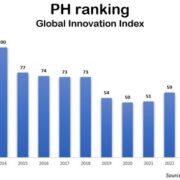TANAUAN CITY, BATANGAS — The Philippine Manufacturing Co. of Murata Inc. (PMM), a local manufacturing subsidiary of Japanese electronic parts maker Murata Manufacturing, announced on 01 August 2023 the construction of a new production building located at the First Philippine Industrial Park in Tanauan City, Batangas.
Murata Manufacturing was founded in Kyoto, Japan in 1944. As of March, this year, it has a consolidated sales amount of JPY 1.69 trillion and over 73,000 employees. The company is engaged in the research & development, production, and sales of ceramic-based electronics used in Apple iPhones and other devices.
In the Philippines, the PMM was established in 2011, it manufactures multilayer ceramic capacitors (MLCCs), which is the main product of Murata group. PMM employs approximately 3,500 employees in the Philippines. Since 2012, it has significantly contributed to the country’s exports with its accumulated export sales amounting to P68.6 billion.
The construction of a new production building is a follow through to the signing of the Letter of Intent (LOI) between Murata and the Department of Trade and Industry (DTI) on 10 February 2023, which was also witnessed by President Ferdinand R. Marcos Jr.
PMM intends to increase its manufacturing capacity in the Philippines and their JPY11.2 billion (or equivalent to P4.4 billion) investment is in line with their avowed expansion plans.
President Marcos Jr. stated that Japanese semiconductor and electronics companies like Murata Manufacturing are “a prime generator of jobs” in the Philippines, and that they “provide support for sectors critical to industrial development” and carry with them “the promise to create value through innovation in global manufacturing around the world.”
The new production building will have two stories and a total floor area of 77,981 square meters. This aims to improve the company’s capacity to meet increasing demand for their products once completed in September 2025.
Murata expects the demand for MLCCs to increase significantly in the medium to long term due to new technologies like the electrification of cars and Internet of Things (IoT), and hopes to tap demand tied to electric vehicles and 6G communications technology in the coming years.
Trade and Industry Secretary Alfredo Pascual said, “With the demand expected to grow in the global market, we would like to explore how we can encourage Japanese companies to expand and upgrade their operations in the Philippines.”
Special Trade Representative (STR) Dita Angara-Mathay, commercial counselor of the Philippine Trade and Investment Center (PTIC) in Tokyo emphasized that the Philippines aims to be a regional hub for electronics manufacturing.
The country’s merchandise exports increased by 1.9% in May compared to last year, with electronics remaining to be our biggest export, accounting for 57.5% of the total.






